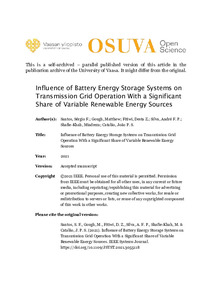Influence of Battery Energy Storage Systems on Transmission Grid Operation With a Significant Share of Variable Renewable Energy
Santos, Sérgio F.; Gough, Matthew; Fitiwi, Desta Z.; Silva, André F. P.; Shafie-Khah, Miadreza; Catalão, João P. S. (2021-02-15)
Santos, Sérgio F.
Gough, Matthew
Fitiwi, Desta Z.
Silva, André F. P.
Shafie-Khah, Miadreza
Catalão, João P. S.
IEEE
15.02.2021
Julkaisun pysyvä osoite on
https://urn.fi/URN:NBN:fi-fe202103086698
https://urn.fi/URN:NBN:fi-fe202103086698
Kuvaus
vertaisarvioitu
©2021 IEEE. Personal use of this material is permitted. Permission from IEEE must be obtained for all other uses, in any current or future media, including reprinting/republishing this material for advertising or promotional purposes, creating new collective works, for resale or redistribution to servers or lists, or reuse of any copyrighted component of this work in other works.
©2021 IEEE. Personal use of this material is permitted. Permission from IEEE must be obtained for all other uses, in any current or future media, including reprinting/republishing this material for advertising or promotional purposes, creating new collective works, for resale or redistribution to servers or lists, or reuse of any copyrighted component of this work in other works.
Tiivistelmä
The generation mix of Portugal now contains a significant amount of variable renewable energy sources (RES) and the amount of RES is expected to grow substantially. This has led to concerns being raised regarding the security of the supply of the Portuguese electric system as well as concerns relating to system inertia. Deploying and efficiently using various flexibility options is proposed as a solution to these concerns. Among these flexibility options proposed is the use of battery energy storage systems (BESSs) as well as relaxing system inertia constraints such as the system nonsynchronous penetration (SNSP). This article proposes a stochastic mixed-integer linear programming problem formulation, which examines the effects of deploying BESS in a power system. The model is deployed on a real-world test case and results show that the optimal use of BESS can reduce system costs by as much as 10% relative to a baseline scenario and the costs are reduced further when the SNSP constraint is relaxed. The amount of RES curtailment is also reduced with the increased flexibility of the power system through the use of BESS. Thus, the efficiency of the Portuguese transmission system is greatly increased by the use of flexibility measures, primarily the use of BESS.
Kokoelmat
- Artikkelit [2609]
